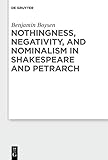Nothingness, Negativity, and Nominalism in Shakespeare and Petrarch / Benjamin Boysen.
Material type: TextPublisher: Berlin ; Boston : De Gruyter, [2020]Copyright date: ©2021Description: 1 online resource (X, 185 p.)Content type:
TextPublisher: Berlin ; Boston : De Gruyter, [2020]Copyright date: ©2021Description: 1 online resource (X, 185 p.)Content type: - 9783110691672
- 9783110691856
- 9783110691771
- 800
- online - DeGruyter
- Issued also in print.
| Item type | Current library | Call number | URL | Status | Notes | Barcode | |
|---|---|---|---|---|---|---|---|
 eBook
eBook
|
Biblioteca "Angelicum" Pont. Univ. S.Tommaso d'Aquino Nuvola online | online - DeGruyter (Browse shelf(Opens below)) | Online access | Not for loan (Accesso limitato) | Accesso per gli utenti autorizzati / Access for authorized users | (dgr)9783110691771 |
Frontmatter -- Contents -- Preface -- I. Introduction -- II. Petrarch and the Triumph of Exile -- III. Rerum vulgarium fragmenta: Petrarch’s Labyrinthine Mirror -- IV. Shakespeare’s “Nihilism” -- V. Early Modernity and the Foil of Contrarieties -- VI. Literature -- Index
restricted access online access with authorization star
http://purl.org/coar/access_right/c_16ec
Being exposed to the Nominalist expansion in early modernity, Petrarch and Shakespeare are highly preoccupied with a Nominalist dimension of language and representation. Against this background, the study shows how these Renaissance poets advanced a special notion of subjectivity and identity as rooted in negativity, otherness, and representation. The book thus argues for a new understanding of negative modes of subjectivity in Petrarch and Shakespeare. A new and sharpened understanding emerging from an interpretation of Francesco Petrarch’s notion of exile and of love in his great poetical cycle Rerum vulgarium fragmenta as well as a meticulous examination of the concept of nothingness in William Shakespeare’s works. Petrarch and Shakespeare poetically show how identity is alien and decentred – yet also free and expanding. In other words, these poets illustrate how subjectivity is constituted by heterogeneity. Moreover, pointing to other examples of this negative subjectivity in Renaissance philosophy and poetry, the study suggests that these models for subjectivity could be extended to other early modern writers.
Issued also in print.
Mode of access: Internet via World Wide Web.
In English.
Description based on online resource; title from PDF title page (publisher's Web site, viewed 25. Jun 2024)


